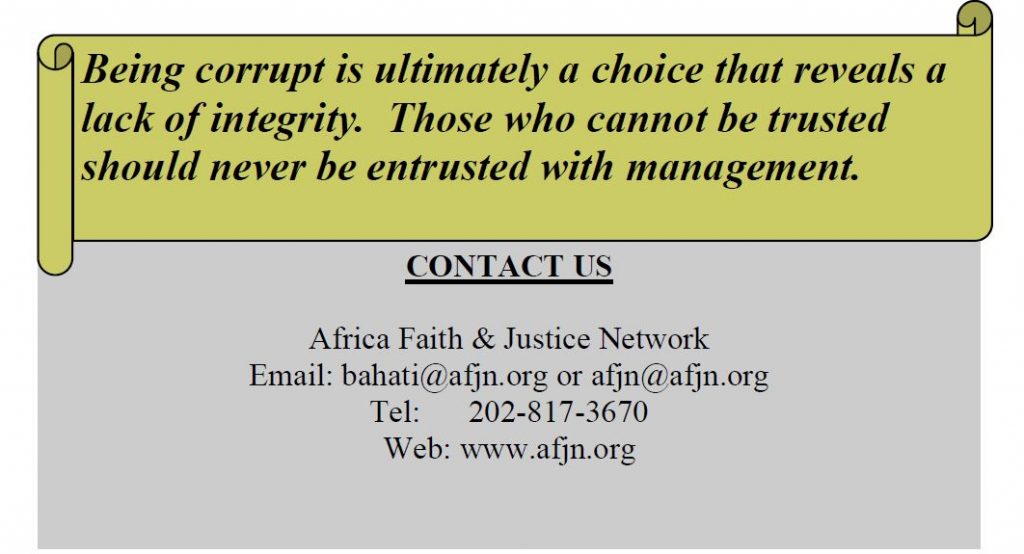By Ntama Bahati Jacques, Policy Analyst , Africa Faith and Justice Network
Edited by David P. Mahoney, CFX
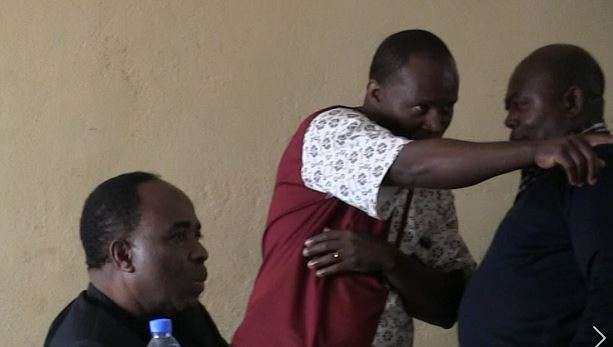
Corruption grips African societies, economies, and politics. No matter how small, it must not be minimized and must be confronted, if prosperity is ever to be secured. Countless meetings and endless reports have said little about those taking action against corruption. (Download PDF File here)
With funding from the Raskob Foundation for Catholic Activities and matching grants from other partners, the Africa Faith and Justice Network (AFJN) has carried out an anti-corruption pilot project in the Diocese of Bafoussam in Western Cameroon. Church leaders, both clerical and lay, have been working to promote integrity and social change and have helped yield positive results combating corruption at the Fossang Catholic Health Center.
About Fossang
The small village of Fossang, in the town of Foumbot, western Cameroon, is home to Muslims, Christians, and traditionalists, who live together peacefully. In 2011, Catholic nuns from the indigenous order of Sisters of the Holy Family of Bafoussam settled in Fossang to respond to health and educational needs of the entire community. Though culturally and spiritually rich, Fossang’s population is economically poor. Yet since the war in Anglophone Cameroon, they have welcomed many of the internally displaced, intensifying their own hardships.
Church Act Together against Corruption Project
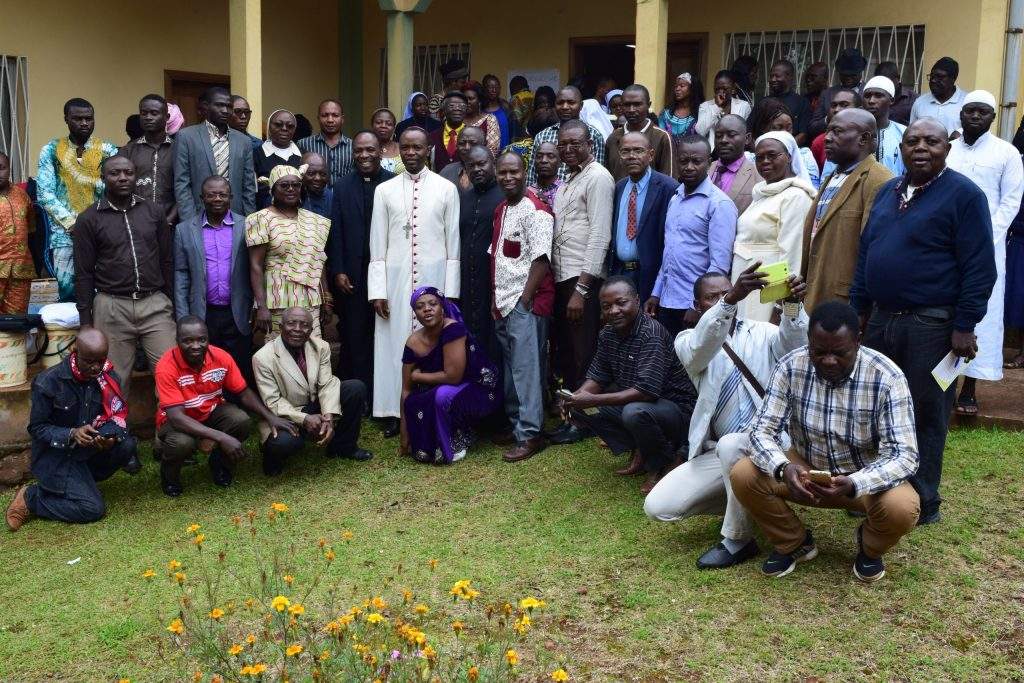
The Church Act together Against Corruption project of the Africa Faith and Justice Network (AFJN) is being implemented in the Cameroon Diocese of Bafoussam where a pilot program has shown that true leadership is a prerequisite in the fight against corruption. The local partner of AFJN is the Bafoussam Diocesan Justice and Peace Commission (BDJPC). Already enough has been achieved on which to build corruption-free institutions such as schools and hospitals and environments where willing citizens are empowered to become corruption-free individuals and are working hard to create corruption free zones and society.
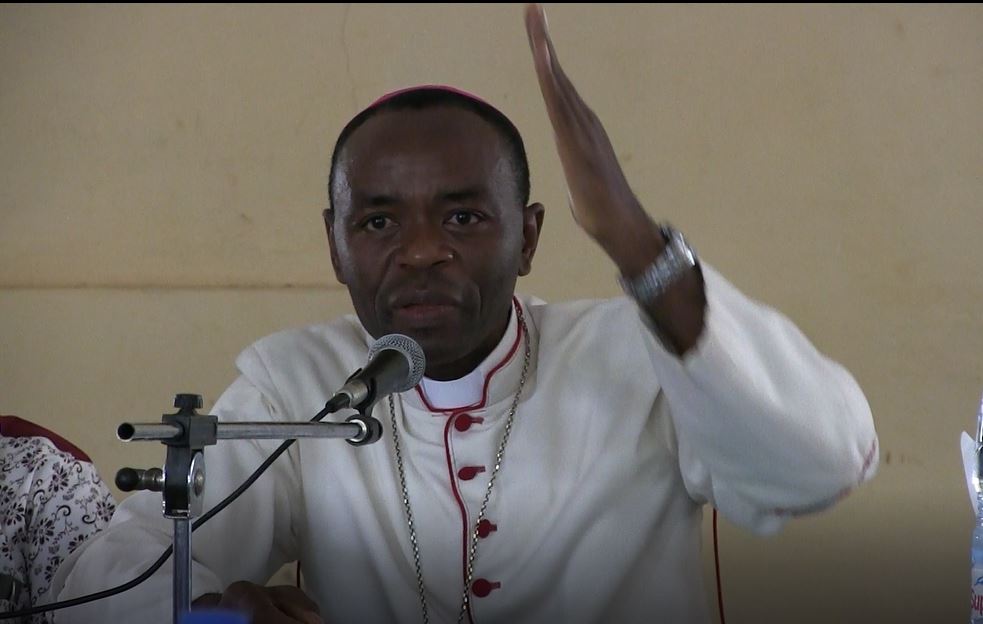
2019 Church Act Together Against Corruption Project Launch .
The story of Fossang is just one of many positive outcomes of efforts since the launch of this project. In 2019, a short survey of some schools and health centers of the Diocese of Bafoussam confirmed the existence of corruption in these institutions. The official launch among diocesan development services of the Church Act Together Against Corruption project was held in Bafoussam from July 3-5, 2019. Lending unconditional support and leadership were Bishop Dieudonné Watio, ordinary of the diocese, and former auxiliary Bishop Emmanuel Dassi Youfang, who became Bishop of the Diocese of Bafia in 2020.
The project’s strategy has been to use radio, personal meetings and town meetings to engage students and their parents; parish members through their small faith-based communities and ministries; justice and peace commissions and clubs in parishes and schools; and workers and managers of diocesan services at all levels and the general public.
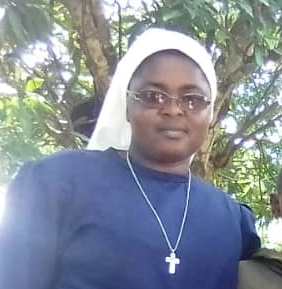
Administrator of Fossang Health Center
The Town Hall meeting which led to all staff Resignations at Fossang
Fossang is one of the many places where Bafoussam Diocesan Justice and Peace Commission (BDJPC) held Town Hall meetings to raise awareness of the project among school and health center personnel and send a message that the diocese would no longer tolerate corruption in any of its institutions. During the gathering, Sr. Hélène Madinko, the administrator of Fossang Health center stood up to corrupt staff by describing openly and in detail the kinds of corruption she knew were happening in the school and the health center. Her frank denunciation agitated the staff. In an interview with AFJN Policy Analyst Jacques Bahati, Sr. Madinko said the health center staff run parallel services that include selling personal medication to patients of the center, collecting “commissions” for discounting service fees, and diverting patients to their friends’ clinics. Corrupt practices have greatly impacted the center’s reputation, financial viability, and quality of care. After the Town Hall meeting, Sr. Hélène was determined to act against the corrupt practices of staff at the Fossang Health Center.
Establishing Proof of Wrongdoing
Sr. Teka Viviane was asked to reside at the center to provide leadership and gather in the community more evidence of wrongdoing. While many in the community served by the health center and the school were reluctant to come forward, a few courageous individuals did speak up, said Sr. Hélène. One patient informed the sisters she had paid 15,000 Francs but was issued a receipt for only 10,000 Francs. One common practice is that a client agrees to a discount in exchange for accepting a receipt indicating less than the amount paid. The issuer of the receipt thus pockets the difference.
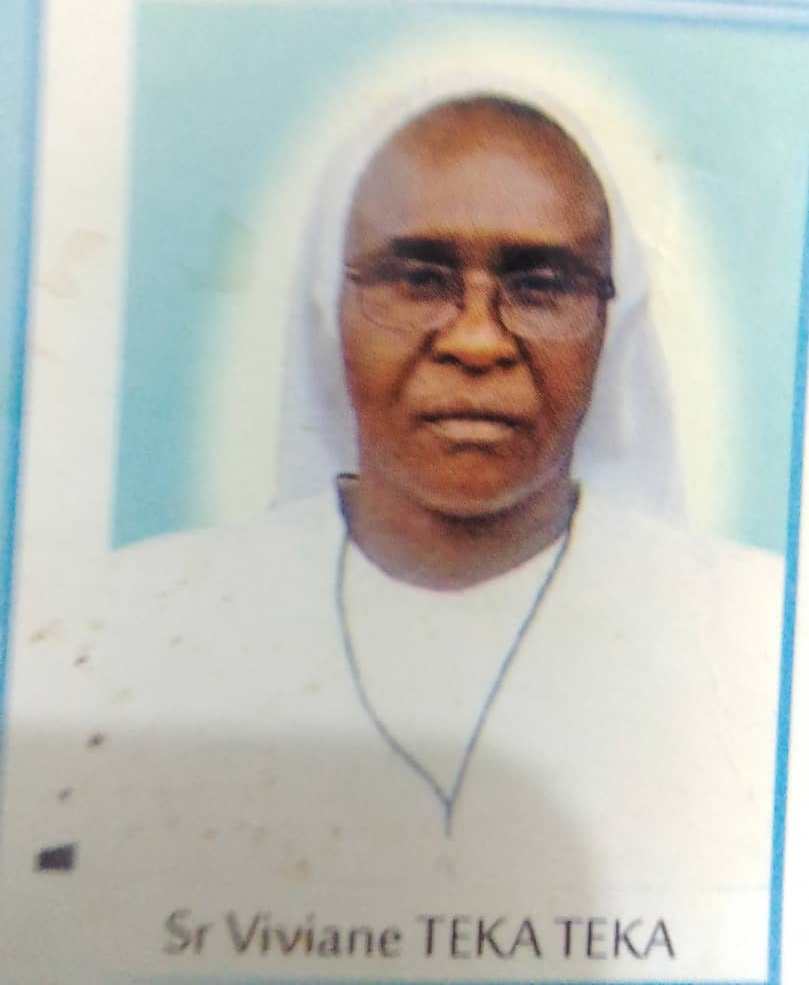
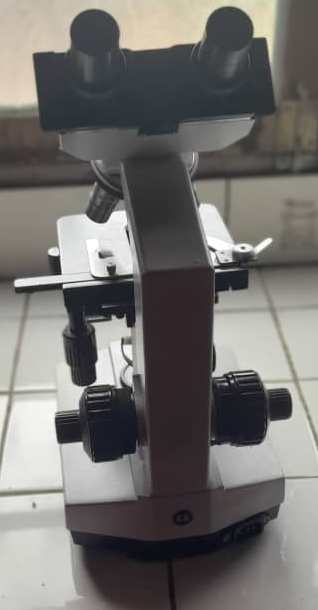
Widespread Corruption Scheme
Sr. Vivian discovered that the lab technician was doing tests at home, using resources of the health center and keeping the fees. Tests that could be done at the center were sometimes referred to friends’ labs for commission. Nurses sometimes issued prescriptions and directed patients to outside pharmacies rather than the center’s own pharmacy, enjoying kickbacks for the business sent elsewhere. Clinicians would offer discounted consultations outside the clinic to patients they had met at the health center. Staff stole medication, claiming that the medicine was damaged in handling. The pharmacist would sell the clinic’s medication without recording the transactions and then buy the same drugs from outside pharmacies to reshelve them at the clinic. When the sisters asked why the pharmacy’s stocks were not moving, they were told that patients were simply not buying from the center. At the same time, staff were reproducing receipts intended to be exclusive to the diocesan health system, thus bypassing a two-tiered transparency surveillance mechanism. Practices such as these have caused enormous financial loss to the health center.
Accountability Followed by Resignation
Sr. Hélène took the administrative measure of appointing one staff member to a distant and remote health center for a month, pending further action. The employee could not stand the conditions at the post and abandoned after two weeks. Another staff member was offered a withholding of 10,000 Francs from monthly pay, to be considered restitution to the health center for five years of theft over five years of service. With pressure mounting, these tough measures led to the resignation of all five of the health center staff, to the relief to the sisters.
Corruption attributed to low wages
Can low wages justify corruption? The Fossang Health Center staff complained that they were not adequately paid. Though the complaint is true, the health center cannot pay workers adequately if it is losing income because of widespread corruption orchestrated by staff. While low pay is cited as one cause of corruption, to try to justify involvement in corruption because of inadequate pay is disingenuous. Anyone being hired is ordinarily informed about compensation for service. Being corrupt is ultimately a choice that reveals a lack of integrity. Those who cannot be trusted should never be entrusted with management.
Corruption Beyond Fossang Health Center
Asked whether Fossang Health Center’s occurrences go on elsewhere, Sr. Hélène told AFJN’s Bahati, “When we [leaders] get together, it’s the same story we hear from each other. Measures are put in place, but corrupt associates find new ways to counter these measures. Many of our anti-corruption and surveillance measures are constantly bridged. “Some health centers check bags before staff enter the building to prevent outside medications from coming inside, but they make it inside anyway,” she explained. “To solve this problem, we have to digitize some of the processes, but we can’t do this at Fossang because we do not have electricity.” She added that the work of the BDJPC has been very helpful.
Fossang Health Center After Staff Resignation
Sr. Hélène said that she has a new team since the resignation of the former staff. “They need support and things are looking good.” The support most needed is strong leadership, which at this moment is not possible. Lack of funding has stalled the sisters’ attempts to build a convent nearby at the level of the foundation. Sr. Hélène insists that the presence of a local community of sisters would allow them to serve better and serve in many other ways. During her three-month posting at Fossang Health Center, Sr. Viviane was lodged in the center’s only hospitalization room. Whenever it was needed, she commuted a long distance over a difficult road. Her efforts helped shine light on what was truly going on, and decisions were made to remedy staff corruption.
Expanding the Vision
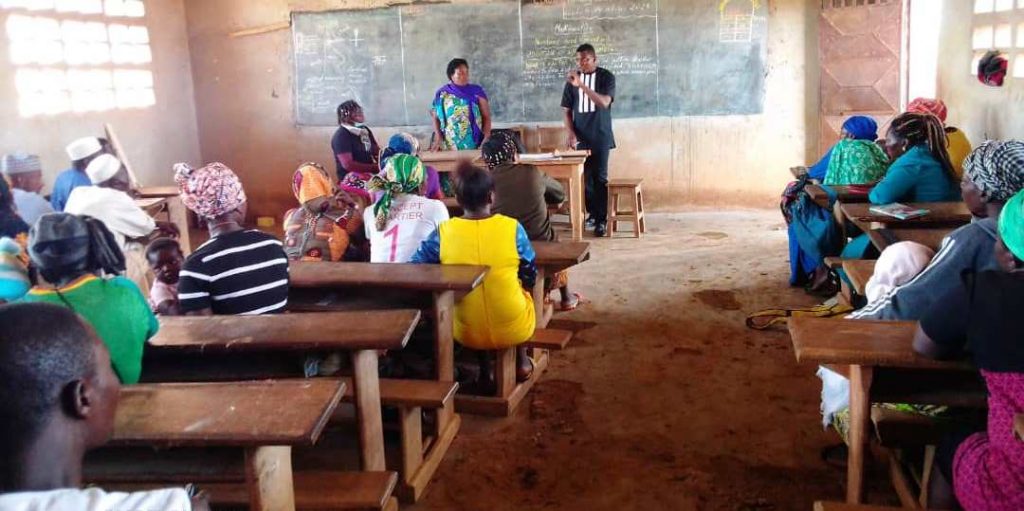
Fossang Town Hall Meeting Parents-Teachers and Justice and Peace Commission Diocese of Bafoussang
The Church Act together Against Corruption project made substantial progress which needs to be sustained and institutionalized at the health centers and the schools. The Church-run primary school has issues comparable to those of the health center, and proper attention was given to ensure adequate education for the children of Fossang. AFJN and BDJPC, thanks to funding from the Raskob Foundation for Catholic Activities, are raising community awareness to prevent corruption and promote the issuance of birth certificates.
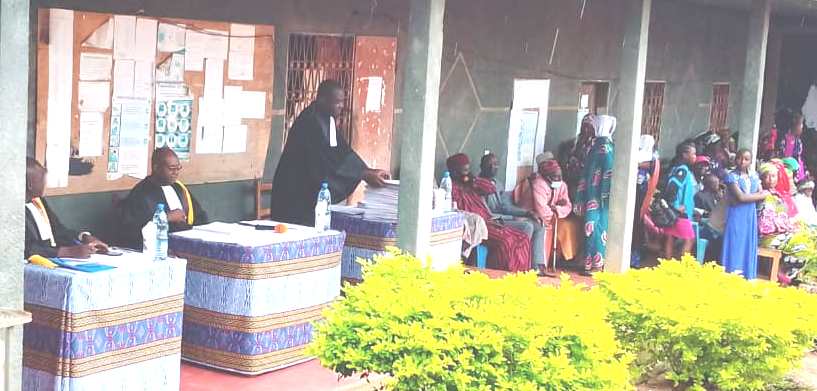
Bringing Justice to The people “Justice Foraine” in Fossang
In October 2021, at what is called “Justice Foraine” — a justice fair — for one day the court held an open-air session in Fossang and more than 280 school children under the age of 15 had their birth certificates established on the spot. Acquiring a birth certificate is a life-changing event for the beneficiaries, who will never deal with corruption in relation to this precious document. The corruption prevalent in the issuance of birth certificates can be prevented by greater education and awareness. Anyone without a birth certificate is practically stateless and cannot pursue higher studies, sit for national exams, or obtain a national identification.

Moving Forward and Special Requests
The Sisters of the Holy Family of Bafoussam are moving forward with the vision of Church Act Together Against Corruption as an important part of their ministry. They require help to build their convent in Fossang. To improve the quality of care and rebuild its reputation, the Fossang Health Center needs a generator. Finally, Sr. Hélène has asked BDJPC to establish a Peace and Justice Club in the school or in the area to continue raising awareness of the devastating consequences of corruption in the lives of citizens. The Church Act Together Against Corruption project has laid groundwork to help the diocesan institutions and workforce become corruption-free. Work must continue to institutionalize what has been achieved.
